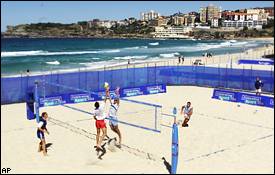



|

|
Tuesday, September 19
The magic of the Olympics can sneak up on you
By Adrian Wojnarowski
Special to ESPN.com
SYDNEY, Australia -- Beyond the soft sands and crumbling waves of Bondi Beach, the
orange sun was dropping down and disappearing into the distance. To stand on
the shores, listen to the sweet song of the surf, see the stars sparkling
above Australia, is to feel like you're falling in love for the first time.
|  | | Olympic beach volleyball will be played at a scenic venue at Bondi Beach. |
Sydney is siren calling out of the ends of the earth, a seductive temptress
luring the world to its shores.
So, it's Sunday night here and you walk past the structure for the Olympic
beach volleyball venue, a grunt, a groan and the smacking of a ball shatters
the stillness. You step closer and discover there are two long, lean women
taking turns setting and spiking a ball over the net. They're wearing nylon
sweatsuits, with Bulgaria emblazoned on the back and a middle-aged man, a
coach, watches with a critical eye.
A little later, you discover these are sisters Petita and Lina Yanchulova.
They compose Bulgaria's beach volleyball team, Olympians for the first time.
You sit in the sand and watch for a few minutes, imagining Saturday morning
and 8,000 people packed shoulder to shoulder in the stands here. The
Yanchulova sisters aren't expected to challenge for a medal, but for a few
moments on this night, with the moon rising over the Pacific and the
gathering darkness making it harder and harder to see the ball crushed to the
corners of the court, these two don't seem to mind.
They've done it thousands of times together, and maybe, they can do it in the
dark, too. They've worked a lifetime to get to the Olympics, and maybe,
they'll never get back again. So, yes, it seems they're willing to stay on
Bondi Beach until the sun is shining on Saturday, until the sold-out stadium
is screaming and the Olympics Games are under way. They've worked a lifetime to
get here, and now, they're down on the beach, hitting the balls in the dark,
clutching a moment in time.
This is the spirit of the Olympics. These are the Games. There's too much
cash, commercialism and corruption, but dig down and peel back the layers --
past the IOC bureaucrats lining their pockets with dirty deals, past the
doped athletes and dreadful Dream Team living beyond the border of the
athlete's village in 5-Star accommodations -- and it always amazes you on
where you'll actually find the Olympics.
This time, there was a moment on the beach just hours after arriving in
Sydney. Four years ago, I walked the streets of Atlanta, soaking through
shirts and staring skyward at the inflatable Gumbys and Coca-Cola bottles,
wondering how this magnificent spectacle could be reduced to the Georgia
State Fair. And then, a Turkish weightlifter, Naim Suleymanoglu -- a
chain-smoking, featherweight wonder called Pocket Hercules --- grabbed a
barbell, set and broke three world records until a Greek lifter could no
longer match him. Eventually, the cramped Georgia Congress Center was awash
in a delirious impromptu parade of Turkish flags.
Two years ago at the Nagano Winter Games, it was at the bottom of a sky jump
in Hakuba, Japan, with 45,000 screaming Japanese suddenly standing silent in
the driving snow. This was the final round of the team competition, and the
Japanese jumper leaning in the starting gate, Mashahiko Harada, had cost his
country the gold medal four years earlier with the worst performance of his
life. So ashamed, he issued a public apology to his countrymen.
Now, it was happening again. The greatest jumper in history had butchered his
first three jumps of the day. Still, Japan had a chance to get the gold.
Across the nation, activity stopped, stores closed and people held vigil over
television and radios. Finally, it was down to Harada. Again. So, the most
tortured soul in his sport let loose into the sky, soaring to an incredible
jump.
Japan won the gold, and Harada was no longer his country's Bill Buckner. He
sprinted in delirous circles in the snow, waved a flag and when a Japanese
television reporter pushed a microphone into his face, the poor guy couldn't
get a question out. Like Harada, he was sobbing, too.
All I remember is rushing back to the press room, banging out a breathless
900-word column on deadline and, eventually, climbing on a bus for the ride
back down the mountain. In my mind, there was Harata, dancing his delirious
dance and 40,000 people hugging in the driving snowstorm, and thinking, man,
how this had been something to see. Suddenly, there was a tear rolling down
my cheek, too, a tear for the scene, the moment, and just maybe, a tear of
thanks that these Olympics come every couple years now.
There's so much to make cynicial and nonbelieving and just when the stink of
it all comes close to consuming us, there's an Olympic moment to remind us of
all the glory and good of sports.
Anyway, the other night on Bondi Beach,
with the waves crawling to the shore and rolling back again, I watched the
Bulgarian sisters play volleyball with the sun disappearing into the
distance. Sometimes, the Olympics just sneak up, steal your heart and make
you fall in love with them all over again.
Adrian Wojnarowski, a columnist for the Bergen (N.J.) Record, is a regular
contributor to ESPN.com.
|  | |
ALSO SEE
Kreidler: Scandal knows no boundaries
|







